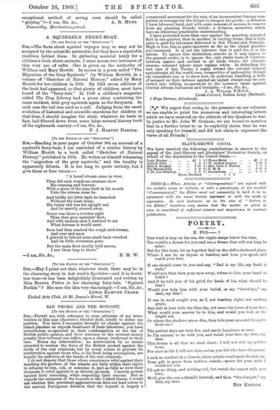SAN THOME AND THE BOYCOTT. [To Tim EDITOR OP T88
"SPECTATOR."] Sin,—Permit me, with reference to your criticism of my inter- vention in this case (Spectator, October 2nd), briefly to define my position. You have, I recognise, brought no charge against the island planters as regards treatment of their labourers ; you have nevertheless co-operated in their condemnation at the bar of British public opinion, and their sentence to the severest money penalty that tribunal can inflict, upon a charge irrelevant to their case. Hence my intervention ; an intervention by no means intended to weaken the force of the British protest against the deeds of the real criminals, but by every means to prevent its misdirection against those who, so far from being accomplices, are largely the sufferers at the hands of the real criminals. I do not dispute that those whose consciences rebel against their touching the produce of the islands are fully within their rights in refusing to buy, sell, or consume it, just as fully as were their stomachs to rebel against it on dietetic grounds. I merely protest against their reasoning, while respecting their reasons. But as regards the extension of the boycott to the United States, I would ask whether this persistent aggressiveness does not lend colour to the current Portuguese delusion that the boycott is largely a commercial movement for the rain of an inconvenient foreign com- petitor in revenge for the failure to cheapen his goods,—a delusion I have laboured hard, and with some measure of success, to remove from my planting friends' minds ; a delusion, moreover, which bars an otherwise practicable understanding.
I have protested more than once against the assertion, repeated first in one quarter, then in another, in varying forms, that a high price is paid for labourers delivered in San Thome and Principe. High or low, this is quite incorrect as far as the island planters are concerned. It is not the labourer that is paid for, it is his labour. To ignore this distinction, minute as it may appear to the general reader, is to ignore the only stable basis of relations between master and servant in all lands where, for climatic reasons, coloured labour must replace white. In defending the test case of San Thome, I really defend the colonial tropical agriculturist all the world over, irrespective of nationality, though my immediate aim is to show how, by judicious handling, a body of accused on their defence against an unjust charge may be con- verted into willing eo-operators in the common cause against Central African barbarism and brutality.—I am, Sir, &c., J. A. Wrzaan, F.R.G.S., Lieut.-Colonel, Indian Army (Retired). 1 Hops Terrace, Edinburgh.














































 Previous page
Previous page